Sleep Apnea Dangers: How Ignoring it Can Impact Your Health
Sleep apnea is a serious sleep disorder that affects millions of Australians, even though it often goes unnoticed. However, ignoring its symptoms can have a significant impact on your overall health, so early intervention and proper treatment is crucial.
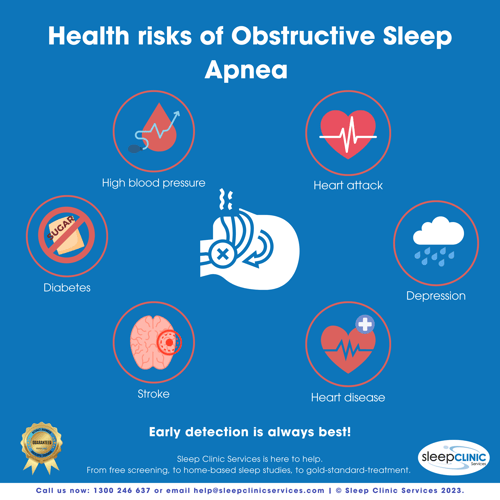
So, what exactly is sleep apnea?
Obstructive sleep apnea (OSA) happens when your breathing passage (airway) narrows or closes, causing you to literally stop breathing while you sleep.
This leads to interrupted sleep patterns which leave you feeling like you never really rested. If you’ve got it, you might notice persistent symptoms like loud snoring, feeling tired all day, waking up with headaches, and struggling to focus.
What’s scary is, if left untreated, sleep apnea can have severe impacts on your health and mental well-being. Sleep apnea has been clearly linked to diabetes, depression, hypertension, stroke and heart disease.
Even without the health damage, sleep apnea sufferers are at much higher risk of death or injury from accidents due to excessive daytime sleepiness.
But it’s not all doom and gloom… By understanding the dangers of sleep apnea and seeking proper treatment, you can improve your quality of life and protect your long-term health.
The bottom line is, if you think you have sleep apnea, don’t ignore it - get the help you need. It’s a big deal for your health and well-being.
Understanding Sleep Apnea
Sleep apnea is the most serious type of sleep disordered breathing (SDB). The pauses in breathing it causes (also called apneas) can last anywhere from a few seconds to minutes (!) and can occur multiple times per hour. In fact, people with severe sleep apnea experience 30 or more episodes per hour.
The most common type of sleep apnea is obstructive sleep apnea, which occurs when the muscles in the upper airway fail to keep the airway open. The soft tissue literally collapses into your airway, stopping you from breathing.
Sleep apnea can affect people of all ages, genders, and body types. However, certain factors can increase the risk of developing sleep apnea, such as obesity, smoking, alcohol consumption, and family history.
If you think you might have sleep apnea, take our free quick and easy risk assessment.
The Dangers of Untreated Sleep Apnea
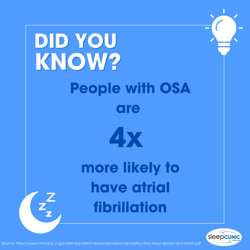
Heart Health:
One of the biggest dangers of untreated sleep apnea is its significant impact on your heart and your blood vessels (arteries, veins and capillaries).
Sleep apnea has been linked to high blood pressure, heart disease, and an increased risk of stroke. This is because during sleep apnea, the body's oxygen levels decrease, leading to an increase in blood pressure and heart rate - which puts a massive strain on your heart. Sleep apnea has also been linked to atrial fibrillation, a condition that causes irregular heartbeats.
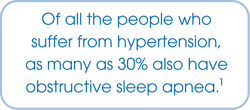
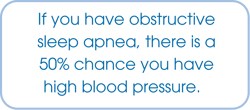
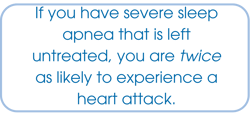
Mental Wellbeing:
It’s no shocker that sleep apnea can also impact your mental and emotional well-being, because when you’re constantly tired the smallest things can set you off.
The resultant chronic sleep deprivation from sleep apnea often leads to irritability, mood swings, and makes stressful situations that much harder to manage. Sleep apnea has also been clearly linked to anxiety and depression.
Daily Life Disruptions:
Untreated sleep apnea throws a spanner in the works when it comes to living your best life, and can mean negative consequences on your day-to-day.
Sleep apnea often makes you feel tired and fatigued during the day. This happens, even after a full night's sleep, because the sleep has been repeatedly disturbed by your breathing stoppages. . This can make it difficult to concentrate at work or school and it increases the risk of accidents, especially while driving or operating heavy machinery.
Sleep Apnea and Weight Gain
Obesity is a significant risk factor for sleep apnea (70% of OSA patients are clinically obese²). This is because excess weight leads to fatty tissue building up in the tongue, soft palate and upper airway walls. Sleep apnea can also lead to weight gain, creating a vicious cycle. Because sleep apnea makes you feel so tired during the day, it’s easy to experience a lack of physical activity and poor dietary choices. This leads to weight gain, which leads to worsened apnea, in a negative spiral.
Sleep Apnea and Diabetes
Sleep apnea also increases your risk of developing type 2 diabetes. Research has shown that people with sleep apnea are more likely to have insulin resistance, a condition that can lead to high blood sugar levels and the development of diabetes.
Sleep apnea can make it difficult to control blood sugar levels, leading to further complications for your overall health.
Sleep Apnea and Relationships
Sleep apnea can also have a profound impact on your relationships. Loud snoring, gasping for air, and pauses in breathing can disrupt sleep for both you and your partner. This can lead to sleep deprivation, irritability, and relationship problems. It often even resorts to couples sleeping in separate bedrooms.
However, effective treatment can lead to improved sleep quality and the reduction of the symptoms that disrupt sleep for both partners. This can help restore same-room sleeping arrangements and healthy relationships.
Treatment Options for Sleep Apnea
There are several treatment options available for sleep apnea. The most common ‘gold-standard’ treatment is continuous positive airway pressure (CPAP) therapy, which involves wearing a mask that delivers a constant stream of gently pressurised air to keep your airway open during sleep. Other treatment options include:
✅Oral appliances
✅Positional therapy
✅Surgery (for more severe cases).
Lifestyle changes can also help improve sleep apnea symptoms. These include:
✅Weight management
✅Stopping smoking
✅Drinking less alcohol
And, interestingly, research has also shown that playing the didgeridoo can help with treatment of sleep apnea, as it is know to strengthen throat muscles.³
The Importance of Addressing Sleep Apnea for Your Health
So, don’t delay - if you think you have sleep apnea, seek professional help ASAP!
Sleep Clinic Services has you covered -- from free screening to at-home sleep studies to effective treatment. Guaranteed. Get in touch today for an obligation free chat with one of our friendly Care Coordinators, or schedule a call and we will call back at a time you choose.
Let’s help you prioritise your sleep and take back control of your health.
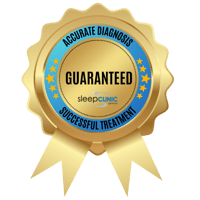
What's it like getting a sleep study with Sleep Clinic Services?


















Care you can trust. For over a decade, Australia's best provider.

Get in touch
Are you ready to reclaim peaceful restorative sleep?
Wherever you are, we can help.
As Australia's leading provider of telehealth screening, diagnosis and solutions for 'sleep disordered breathing' sufferers, we care for people all around Australia.
Questions?
Call during business hours or fill in the form and we'll call you back at the time you choose. No cost, no obligation.


